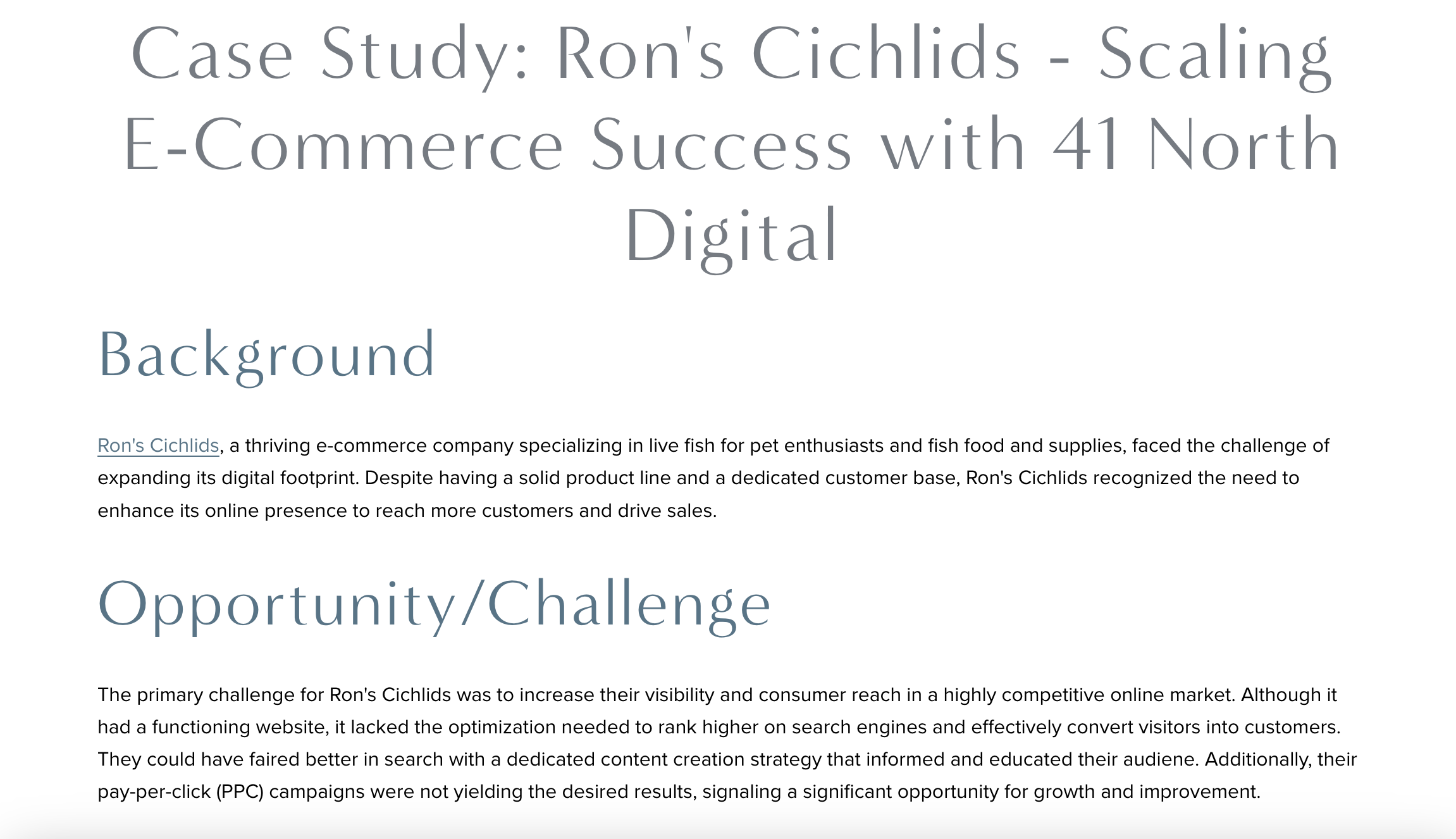Showcasing First-Hand Experience: How to Master Google’s E-E-A-T in 2025
If you’ve been paying attention to SEO in 2025, you’ve likely seen the term E-E-A-T everywhere. Google’s framework for evaluating content, Experience, Expertise, Authoritativeness, and Trustworthiness, is more important than ever.
But here’s the thing: it’s no longer enough to just publish “helpful” content. Google now expects you to prove that you’ve actually lived what you’re writing about. That’s where first-hand experience comes in — the new “E” in E-E-A-T.
At 41 North Digital, we’ve seen first-hand how integrating authentic experiences into content boosts visibility, rankings, and conversions. In this post, we’ll break down what E-E-A-T means in 2025, why first-hand experience is a game-changer, and exactly how your business can demonstrate it to earn trust with both Google and your customers.What is E-E-A-T and Why Does It Matter?
What Is Google’s E-E-A-T in 2025?
Google evaluates content using four core signals:
Experience → Does the author show they’ve personally done, tested, or lived what they’re talking about?
Expertise → Is there depth of knowledge on the subject?
Authoritativeness → Is the site/author recognized in their field?
Trustworthiness → Is the content credible, transparent, and reliable?
Google doesn’t assign “E-E-A-T scores” but uses these signals to decide which content deserves to rank. In 2025, experience is the factor setting great content apart from generic blogs.
Why First-Hand Experience Matters for SEO
Anyone can summarize a topic. Few can show they’ve actually done it. That’s why Google now prioritizes:
Authenticity → Readers want to know “this advice worked in the real world.”
Proof → Data, screenshots, case studies, and stories prove you’re credible.
Differentiation → Unique experiences separate you from competitors regurgitating the same SEO tips.
Example: When we optimized a Rhode Island Divorce Attorney’s site in Rhode Island we didn’t just create location pages. We added attorney bios, case outcomes, and videos from the office — real experience. The result? A 62% increase in organic traffic within six months.
How to Showcase First-Hand Experience in Your Content
1. Tell Your Story with Specifics
Instead of writing vague advice, ground it in your own journey.
Generic: “SEO agencies should be transparent.”
Experience-driven: “At 41 North Digital, we share full GA4 dashboards with every client. One contractor told us this helped him track leads for the first time.”
2. Use Case Studies and Data
Numbers don’t lie. Include before-and-after results to prove your strategies work.
Share how tweaking meta descriptions boosted CTR.
Show how a content refresh improved time on page.
Publish anonymized screenshots from Google Analytics or Search Console.
3. Leverage Multimedia Proof
Google can detect rich content formats, and users trust them more.
Add client testimonial videos.
Use annotated screenshots of your SEO audits.
Create charts that highlight results.
4. Highlight Your Experts
Make authors visible — with bios, credentials, and quotes.
Example: A blog on GA4 migration should feature commentary from your analytics specialist.
This shows Google (and users) that real experts are behind your content.
5. Be Transparent About Challenges
Authenticity isn’t just bragging about wins. Share what didn’t work and what you learned.
Example: We tested a new backlink strategy for a client in Stamford. It failed at first, but by pivoting to digital PR, we landed placements that doubled referral traffic. It’s important to highlight things like this. It adds validity and shows we are all human. No one gets it right the first time, it’s about strategizing and optimizing to find what works best.
Best Practices for Mastering E-E-A-T in 2025
To consistently showcase experience and build authority:
Update Content Regularly → Outdated examples signal low trust.
Engage with Your Audience → Reply to blog comments, share insights on LinkedIn, run webinars.
Cite Reputable Sources → Link to Google, Moz, or Search Engine Land to back claims.
Use Structured Data → Implement FAQ and Author schema for better visibility in search results.
Real-World Examples: Bringing Theory into Practice
To illustrate the power of first-hand experience, consider the following scenarios:
A Local Business Case Study
Imagine a local retailer struggling to increase online sales. By shifting their focus to first-hand customer testimonials and detailed case studies in their blog posts, they were able to showcase real improvements in customer satisfaction and conversion rates. The transparency and authenticity of their content not only boosted their SEO rankings but also built a loyal customer base.
A National Brand’s Digital Journey
A national brand in the e-commerce space revamped its content strategy by integrating behind-the-scenes videos and expert interviews. By sharing the intricacies of its operations and highlighting the team’s expertise, it built a narrative of trust and reliability. This approach significantly increased its organic search traffic and engagement rates.
These examples underline that regardless of your business size, first-hand experience is a powerful asset. It makes your content relatable and actionable, which in turn drives higher engagement and better search performance.
In 2025, proving you’ve lived what you teach is the difference between content that ranks and content that’s ignored. Businesses that integrate first-hand experience into their SEO strategy will stand out in crowded search results, build deeper trust, and see stronger growth.
At 41 North Digital, we specialize in helping businesses combine SEO best practices with authentic, experience-driven content that resonates with customers and search engines alike.


